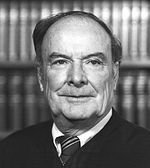 James Skelly Wright was born on January 14, 1911, in New Orleans, Louisiana. He attended public elementary and high school before earning a scholarship to Loyola University of New Orleans. He graduated 1931 with a bachelor’s degree in philosophy and began teaching at a local high school during the day while attending Loyola Law School at night. He received his law degree in 1934. He worked as a history professor at the university until 1937, when he became an Assistant United States Attorney in New Orleans.
James Skelly Wright was born on January 14, 1911, in New Orleans, Louisiana. He attended public elementary and high school before earning a scholarship to Loyola University of New Orleans. He graduated 1931 with a bachelor’s degree in philosophy and began teaching at a local high school during the day while attending Loyola Law School at night. He received his law degree in 1934. He worked as a history professor at the university until 1937, when he became an Assistant United States Attorney in New Orleans.
In 1942, Judge Wright joined the Coast Guard for the duration of WWII. He left the Coast Guard in 1945, with the rank of Lieutenant Commander. He practiced law in Washington, D.C. from 1945 to 1948. In 1948, he served as United States Attorney for the Eastern District of Louisiana. In 1949, President Harry S. Truman nominated Judge Wright to the United States District Court for the Eastern District of Louisiana in 1949.
Judge Wright made many enemies in the South with his progressive stance on equal rights and justices for African Americans. In the 1950’s and 1960’s he presided over Bush v. Orleans Parish School Board, and eventually ordered the desegregation of New Orleans parish public schools. In one order in that case Judge Wright wrote:
“The problem of changing a people’s mores, particularly those with an emotional overlay, is not to be taken lightly. It is a problem which will require the utmost patience, understanding, generosity, and forbearance from all of us, no matter what race. But the magnitude of the problem may not nullify the principle, and that principle is that we all—all of us—freeborn Americans with the right to make our way, unfettered by sanctions imposed by man, because of the work of God.”
Southern senators, displeased with Judge Wright’s desegregation rulings, had blocked efforts by President Kennedy to appoint him to the United States Court of Appeals for the Fifth Circuit in New Orleans. In 1962, President John F. Kennedy nominated Judge Wright to a seat on the United States Court of Appeals for the District of Columbia Circuit, where he eventually became the Chief Judge.
On the D.C. Circuit, Judge Wright continued his dedication to the promotion of civil rights. In 1967, he issued the “Wright Decree” which ordered the bussing of black children from overcrowded schools to under-capacity schools that were predominantly white. He also played an important role in the Pentagon Papers Case, a case concerning the revelation of classified Department of Defense documents concerning the role of United States covert operations in Vietnam. Judge Wright was the only dissenter of the three-judge appellate panel, but was later vindicated by the Supreme Court, which upheld the First Amendment rights of news sources to publish the Pentagon Papers. In the 1986 case Hohri v. United States, Judge Wright ordered that reparations be paid to Japanese-Americans for unjust internment during WWII. He assumed senior status in 1986, serving two more years until his death on August 6, 1988.
If you are interested in learning more about Judge Wright, here is a link to Supreme Court Justice Ruth Bader Ginsburg’s biographical speech, part of the Judge Robert A. Ainsworth, Jr., Memorial Lecture Series: http://www.laed.uscourts.gov/court-history/law-giants#Wright
Sources: https://www.fjc.gov/history/judges/wright-james-skelly
http://articles.latimes.com/1988-08-08/news/mn-4_1_judge-j-skelly-wright
http://www.nytimes.com/1988/08/08/obituaries/judge-j-skelly-wright-segre...
http://law.justia.com/cases/federal/district-courts/FSupp/138/337/1458312/
